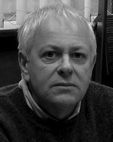DOI: 10.1039/C3CC90221H
(Profile)
Chem. Commun., 2013, 49, 8429-8429
Interview with Chris Moody
Chris Moody
Received 27th June 2013, Accepted 27th June 2013
 Chris Moody | Chris Moody is the Sir Jesse Boot Professor at the University of Nottingham. He was educated at Manchester Grammar School and King's College, London, before carrying out PhD research at the University of Liverpool under the supervision of Charles Rees. He spent a postdoctoral year at the ETH in Zürich working with Albert Eschenmoser before taking up a post in industry at Roche. In 1979 he was appointed to a lectureship at Imperial College, London, and was promoted to a readership in 1989. In 1990 he moved to the chair of organic chemistry at Loughborough University, and in 1996 he was appointed Professor of Organic Chemistry at the University of Exeter. He moved to his current post in Nottingham in August 2005. |
Do you remember what it felt like to publish your first ChemComm article?
I do indeed because it was my very first paper published during the first year of my PhD with Charles Rees (DOI: 10.1039/C39740000486). I was fortunate to join a project on nitrogen–sulfur ylides that was producing a lot of results at the time.How has your research evolved from your first to your most recent article?
Actually, I am still interested in nitrogen–sulfur compounds although the work has evolved from unnatural compounds as synthetic intermediates to an interest in their occurrence as bioactive natural products. Nowadays my main interests are the relationship between chemical structure and the biological effect of molecules, and the efficient chemical synthesis of such molecules.What do you like most about publishing in ChemComm?
The speed of response at all stages. They are few journals that can match the time from submission to an accepted paper appearing on the web.What aspect of your research are you most excited about at the moment?
The community has started to think about organic synthesis in a different way, particularly in terms of its efficiency and sustainability. Whereas some are focusing on the dramatic developments in technology such as flow chemistry, we concerned with new methods for old reactions. For example, should we still be using Cr(VI)-based oxidants? Probably not, and this begs the question, should we still be teaching it to undergraduates? Hence we are interested in metal-free oxidations with air or oxygen as the terminal oxidant. I have also returned to photochemistry for the first time in 30 years, but with a particular focus on sunlight mediated reactions (yes, even in Nottingham!).What is the best part of your job?
The fact that there is always something new happening, whether it is a new cohort of undergraduate or PhD students, or a strange new structure of a natural product appearing in the literature. And, of course, there is still the excitement of finally finishing a research project.What is the secret to success in scientific publishing?
Who knows? The main thing that I have learnt is not to try to referee your own papers, and thereby send it to a “lesser” journal than it merits. Let the journals do the refereeing.What is your advice to young emerging scientists?
Do what interests you, don’t be afraid to tackle big problems, and try not to be influenced by current fads and fashions. Regrettably this is not always possible since one has to take a pragmatic view and think about research funding.What do you do in your spare time?
What spare time? Modern technology such as e-mail seems to generate more work and waste more time than it saves.By the time I'm 100 I would like to have...
...disconnected myself from e-mail.| This journal is © The Royal Society of Chemistry 2013 |
